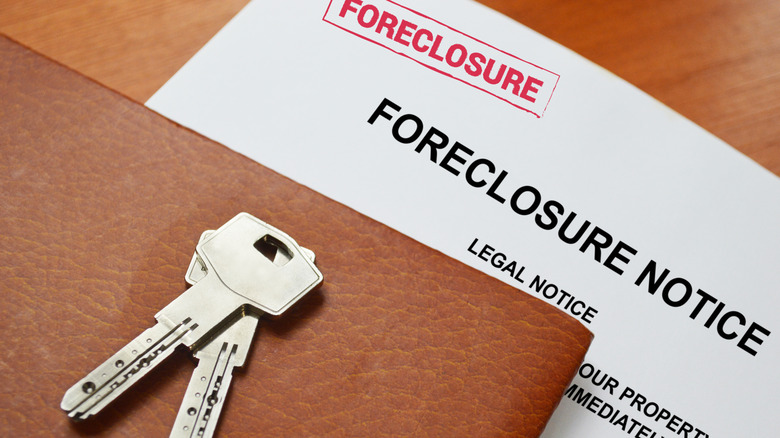Here's What A Short Sale In Real Estate Really Means
Short sales are listings on the real estate market that are made in a state of desperation. Homeowners seeking to sell a property that they will ultimately lose are willing to move the residence at all costs. Unfortunately, this can sometimes lead to a sale that goes for less than the value of your house — specifically, less than the remaining balance on the mortgage loan. Naturally, then, a short sale will be necessarily short of the funding required to break even on the transaction.
In any real estate sale, the lender gets paid back before the owner can relish in their profits, but in a short sale, the borrower will still owe something on the mortgage balance after completing the transaction. Investopedia notes that many states protect borrowers against lawsuits or other action designed to recover this deficit instead of leaving both parties to walk away from the short sale effectively whole.
Buyers and sellers can benefit from short sales in a few key ways. For example, a seller can escape the consequences of a looming foreclosure with the use of short selling techniques, while buyers can take advantage of deflated pricing on a potentially great new home. Yet, approaching a short sale (on either end of the transaction) should always be done with caution and a considerable amount of research and knowledge, as Bankrate notes.
A short sale is used prominently in beaten-down markets
Many short sales take place in significantly depressed markets. One of the key features of short selling is the change in circumstances that come along with these market conditions. For example, when the value of a property falls underwater, as home prices did during the 2007 housing market crash, homeowners may be paying considerably more for their home than the asset is worth, Quicken Loans notes.
Selling a home in this kind of market can lead to a massive downturn in financial mobility for property owners. Coupled with a shrinking job market that may accompany a hindered fiscal environment, many people find themselves faced with an inability to repay their mortgage loans on top of everything else.
This pair of conditions make for a unique vulnerability among homeowners. Of course, the loss of a job, shrinking hours, or a sudden illness can make repaying the mortgage impossible, but selling the home is an equally negative solution to financial hardship. Foreclosures happen in larger quantities during times of hardship, and short sales are a way to avoid this outcome.
Short sales are a means to avoid foreclosure
Instead of going into foreclosure, a short sale can help you, as the property owner, avoid the most intense negative pressure on your credit score resulting from the loss of a home. Foreclosure is the process by which a lender repossesses the property and then tries to sell it to recover the invested capital. Foreclosure is a caustic process for both the homeowner — who loses their home — and the lender, who has to take back the property forcefully and then try to sell it for whatever they can get.
Foreclosure places a heavy burden on your credit score as well, according to Rocket Mortgage. Such a process can prevent you from attaining a new mortgage for quite some time, placing a massive question mark on your living situation for the foreseeable future.
Instead, using the short-selling action can give you the ability to retain some control over the outcome. Rather than giving up the home and hoping for as little damage to your financial future as possible, a short sale allows you to sell the property (instead of the bank) and negotiate the reporting that your lender will do regarding the loan and repayment consistency, along with other aspects. Bankrate notes that negotiations here can result in your lender reporting whether the loan has been paid in full or not. This should be a central goal when finalizing the terms.
A short sale provides muted benefit to everyone involved
Short sales are an act of desperation. They are deployed in an effort to mitigate the damage that will be done through the inevitable foreclosure that is to come. A short sale can be beneficial, though. Reducing the harm that comes to the homeowner allows an individual to walk away from a failed real estate transaction with as little wreckage as possible. Likewise, when the homeowner is responsible for managing the asset's sale, they feel a sense of ownership over the process rather than the cold transactional function that dominates the foreclosure marketplace. Lenders, as a result, typically make out better than they would simply by going through lengthy and expensive foreclosure proceedings.
Buyers also gain access to discounted properties on the market. A short sale is, by nature, a property listed at a discount, but that price reduction comes at a different sort of cost for the buyer. In the same way that properties in foreclosure are often distressed in their upkeep and general appearance, short sales will typically exhibit the same general characteristics, according to Investopedia. Therefore, buying a property listed as a short sale should be done as a fixer-upper project rather than as a more typical home buying opportunity that many are in the market for.
Proving financial hardship is an essential step for sellers
A short sale comes with a unique added string: The seller must gain permission from their lender to list the property in this way. The creditor also has the final say over any deal that is struck between the seller and a buyer because they represent the money in this transaction instead of the seller themselves.
In order to successfully list a home as a short sale on the market, sellers will need to prove financial difficulty that goes above and beyond the typical squeezing of pennies, Jeff Cook Real Estate explains. To be approved for a short sale, a seller's difficulty must come from a change in circumstance. This indicates that the difficulty isn't resulting from cold feet or second-guessing but rather a genuine issue that threatens the lifestyle and ability of the owner to continue making payments. A short sale is a means of escaping the more damaging result of foreclosure during market conditions that don't allow for a typical real estate sale.
Under typical circumstances, the housing market continues on an upward trajectory, meaning that even if you are facing hardship and decide to sell the property, you'll take away some level of profit. Short sales are a ripcord for homeowners in trouble but only function for those who are up against stacked odds and can convince their lender to allow this approach rather than letting the property go to foreclosure.
Buyers will need to move quickly on financing
When purchasing a home listed as a short sale, buyers need to go into the project with their eyes fully open. Not only is the purchase one that falls firmly in the category of a fixer-upper, but the financing for the transaction will need to be squared away quickly. Bankrate reports that lenders tend to require a faster closing procedure than is typical for a standard home purchase. This means pre-approval for a mortgage or working with the original lender to finance the purchase will be necessary to complete the transaction.
Since a short sale buyer is already working with the seller's lender to hammer out details of the acquisition, this is a good way to speed along the process of originating a mortgage loan. The lender will already have several key details, and the process of essentially transferring the debt to a new individual can be a highly lucrative option. If you are considering the purchase of a short-sale home, understanding these constraints will help you make the best decision about the asset in question while keeping your ability to actually close on the sale in play.





